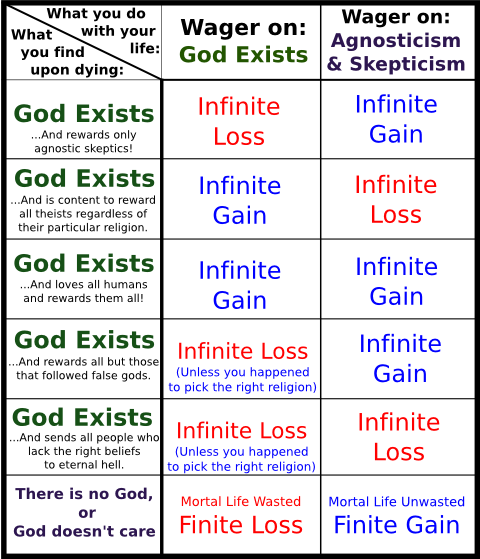

We are extended in space as material beings. Pascal thinks if God exists God is utterly unlike us. What is the everything you win, “an infinity of infinitely happy life.” If you bet your life on God and become a true believer, and it turns out God exists, you win an infinite reward. So bet that he exists, without any hesitation." (Pascal, The Wager) Let us figure out the two results: if you win, you win everything, and if you lose, you lose nothing. Let us weigh up the gain and the loss in choosing heads, that God exists. It is not voluntary you are already involved.
#Pascals wager skin#
Why You Must Bet & The Payout is Infiniteīecause you’re alive you already have skin in the game, so to speak. With the heavy machinery of decision theory in mind, let’s relate this to Pascal’s Wager. The result 0.35(100) + 0.65(20) = 35 + 13 = 48.Īccording to decision theory, a rational agent always takes the choice that maximizes her expected utility, so I should ship the skis to the resort and get ready for catching some sweet air off some cliffs. We add that to the probability it doesn’t snow times the utility of bringing my snowboard if it doesn’t snow.

First, we use the probability that it snows, which is 35% times the utility of bringing my snowboard if it snows, which is 100. Let’s calculate the expected utility of bringing my snowboard. The weather report shows a 35% chance of snow the day before I ski or snowboard. It’s 7 days until my first day on the mountain. The last thing we need to know is how likely it is that it will snow within 24 hours of me hitting the slopes. I can enjoy steep parts of the mountain, and maybe even jump off some cliffs. If I bring my skis and it doesn’t snow, that’s a value of 50. I can still enjoy the mountain and the powder, but it’s not as good as snowboarding powder. If I bring my skis and it snows, that’s worth a value of 70. I’ll be stuck snowboarding parts of the mountain that are icy, and I won’t be able to enjoy the steepest terrain on the mountain. If I bring my snowboard and it doesn’t snow, that’s a value of 20. I’ll get to carve some sweet turns on my board in powder. If I bring my snowboard and it snows that’s worth a value of 100. The four possibilities are bring skis, bring snowboard, it snows, and it doesn’t snow. Let’s represent these outcomes in what’s called a decision matrix. So, I’m going to ship one week ahead either my skis or snowboard. I don’t want to rent skis or snowboards, and I don’t want to lug around more equipment than I need. But, if it didn’t recently snow, it’d be better to ski because I’m a better skier than snowboarder and I can enjoy more of the mountain. If it recently snowed, it’d be better to snowboard because snowboarding in powder is the best. I need to decide whether I’ll ski or snowboard. To see how decision theory works, let’s imagine I’ve decided to take a vacation to a ski resort. His Wager relies on a now standard theory of rational choice called decision theory. Is it rational to choose a religious life? That depends on the value of the payoffs for living such a life and how likely you are to get them. He shifts from truth as the goal to utility. Instead, Pascal’s target is rational choice. Remember he thinks the evidence is mixed on that score when it comes to God. Pascal’s new target is not rational belief, which is based on evidence. Pascal's New Target = The Utility of Belief in God You’ll also learn a powerful objection to Pascal’s Wager. You’ll learn about this new target and how he thinks he hits it, in this video. But to which side shall we incline? Reason can decide nothing here.” To get around this problem, Pascal shifts the target of thinking. Arguments for God’s existence are less than conclusive. Pascal's Wager Explained: Why Belief in God is a Good BetĬonfession: It’s hard to prove God exists.


 0 kommentar(er)
0 kommentar(er)
